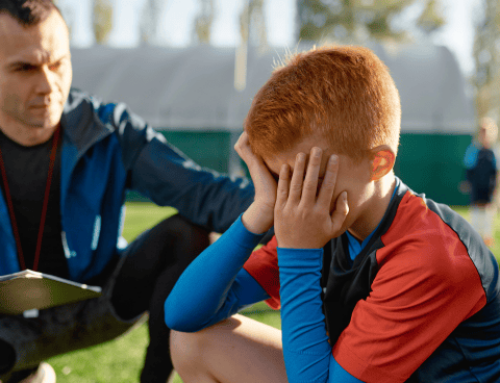4 Tips For First Time Coaches
Being a coach of any kind can be a stressful and intimidating job, especially when you are just starting. There are so many factors that go into being a good coach, such as connecting with athletes, gaining their trust and respect, making sure that they are developing the correct way, and interacting with parents. It is a much more complicated job than most people think. How does one jump into coaching and come across as a good coach from the start? Many that get into coaching want to inspire and change athlete’s lives. There are many ways to achieve goals of becoming not just a coach but a coach that athletes will remember. Here are several ways in which first-time coaches can help themselves overcome the nerves of starting and make an immediate impact in their athletes’ lives.
Educate Yourself
The first step to succeeding as a coach, and most things in life, for that matter, is to educate yourself. This does not mean getting a degree to be a coach, although if strength and conditioning coaching is in your future, a minimum of a bachelor’s degree will be required and most certainly a good idea. Learn from others who have successfully coached before you by reading or watching what they have done. Many books can give insight into what makes a good coach. Podcasts and YouTube are also sources of valuable coaching tips and information.
You will need to educate yourself on several different skills before coaching, regardless of the coaching type. The obvious is the technical side of coaching or what you will have to have the athletes progress and develop in their sport from a skill or performance standpoint. The other less obvious skill to be learned is how to mentally develop athlete’s which is arguably the more important of the two. This skill is much harder to learn than merely having an athlete do a drill. It requires trust between both parties and sees things from multiple points of view as a coach. The education process is a never-ending journey not just for coaching but for anyone wanting to progress in most fields, so find a way to enjoy educating yourself or it may not be for you.
Jump Right In
The next most important tip for first-time coaches is to jump right in (after some education, of course). The fastest way to apply what you have learned and learn about yourself as a coach is by throwing yourself into the fire. Fear is something that we all feel, but what sets some apart is overcoming it. Coaching an entire team for the first time can be a mortifying ordeal, but if you have a plan and just be yourself in front of them, you can overcome your fear.
Having a plan is critical. You will need a rough schedule of what you will be having your athletes do throughout a training session. You should also think ahead about certain situations that could arise during practice and how you will respond to them. For example, if two teammates get into a physical conflict, how will you handle this? That being said, coaches need to think on the fly and quickly react to events that were not on the training schedule.
Engage The Athletes
Part of becoming a good coach and gaining your athletes’ trust is to have them actively engaged mentally and physically during training. On the mental side, athletes need to know why they are doing something from both a short-term and a long-term perspective. Short term, they should be aware of why they are doing a particular drill or performing an exercise. Long term, they need to know why they are playing this sport, where to go with it in the future, and have realistic goals that they can achieve—showing a why their actions give them a reason to continue to drive towards their athletic goals.
Physically, they need a challenge. That does not mean they should be driven into the ground every training session. That is not going to benefit anyone and will most likely end up in injury or burnout. Instead, athletes need to be challenged with a purpose behind it that feeds into their why. Hard work is essential to progress, but that does not mean it cannot be fun. Athletes are unlikely to continue if they no longer find the sport fun. This can be controlled by coaching so as a first-time coach, remember to balance hard work with fun experiences.
Listen
Listening seems like such a simple tip but is one of the most important and often overlooked. It directly relates to gaining your athletes’ trust and being the determining factor in whether you come across as a coach with your salt. Listening is a skill that many struggles with as most would rather talk about themselves than hear what others have to say but much can be learned from simply shutting your lips and opening your ears. If you are transparent and open with your athletes, they will most likely be the same in turn. They will often give insights into if something is working or not if you ask and listen to what they have to say.
In the beginning, when just getting to know your athletes, ask open-ended questions that require an explanation. This will allow them to open up to you and gain their trust quickly. Listening is a skill that can be worked on. Like most of the tips mentioned above, it just takes time and practice, maybe more than you would think.
Conclusion
Coaching can be a stressful job, especially when just starting. There is not necessarily a road map to becoming a good coach, and every situation is different. Still, certain qualities are congruent among all types of coaching, whether it be a sports coach or a strength and conditioning coach.
Education is a mandatory and never-ending journey that will be required to become an effective coach. This is in the form of both technical knowledge and mental skills training. In some cases, formal education will be needed to start a coaching career but either way, learning what others did before to succeed is a smart strategy. Getting out and coaching is key to learning to become a great coach. You can only read and learn so much before you need to go out and demonstrate it. Coaching a team for the first time can be a frightening idea, but the quickest way to get past the fear is to jump right into it. Engaging the athletes both mentally and physically is tip number three. Physically it is not tough to challenge athletes, but it must be done productively and balanced with having fun.
Engaging with your athletes mentally can be much more challenging. Athletes need to define why they are playing this sport and set goals both short and long term. Finally, listen to the athletes. Ask them questions they can talk about and can lead to further conversation. Listening is key to gaining the trust of athletes, setting you apart from a regular coach, and being remembered. Coaches can be very impactful in the lives of athletes, especially those at a young age. First-time coaches need to take the steps to change the lives of those they coach positively.
Read More
RECOMMENDED FOR YOU
MOST POPULAR
4 Tips For First Time Coaches
Being a coach of any kind can be a stressful and intimidating job, especially when you are just starting. There are so many factors that go into being a good coach, such as connecting with athletes, gaining their trust and respect, making sure that they are developing the correct way, and interacting with parents. It is a much more complicated job than most people think. How does one jump into coaching and come across as a good coach from the start? Many that get into coaching want to inspire and change athlete’s lives. There are many ways to achieve goals of becoming not just a coach but a coach that athletes will remember. Here are several ways in which first-time coaches can help themselves overcome the nerves of starting and make an immediate impact in their athletes’ lives.
Educate Yourself
The first step to succeeding as a coach, and most things in life, for that matter, is to educate yourself. This does not mean getting a degree to be a coach, although if strength and conditioning coaching is in your future, a minimum of a bachelor’s degree will be required and most certainly a good idea. Learn from others who have successfully coached before you by reading or watching what they have done. Many books can give insight into what makes a good coach. Podcasts and YouTube are also sources of valuable coaching tips and information.
You will need to educate yourself on several different skills before coaching, regardless of the coaching type. The obvious is the technical side of coaching or what you will have to have the athletes progress and develop in their sport from a skill or performance standpoint. The other less obvious skill to be learned is how to mentally develop athlete’s which is arguably the more important of the two. This skill is much harder to learn than merely having an athlete do a drill. It requires trust between both parties and sees things from multiple points of view as a coach. The education process is a never-ending journey not just for coaching but for anyone wanting to progress in most fields, so find a way to enjoy educating yourself or it may not be for you.
Jump Right In
The next most important tip for first-time coaches is to jump right in (after some education, of course). The fastest way to apply what you have learned and learn about yourself as a coach is by throwing yourself into the fire. Fear is something that we all feel, but what sets some apart is overcoming it. Coaching an entire team for the first time can be a mortifying ordeal, but if you have a plan and just be yourself in front of them, you can overcome your fear.
Having a plan is critical. You will need a rough schedule of what you will be having your athletes do throughout a training session. You should also think ahead about certain situations that could arise during practice and how you will respond to them. For example, if two teammates get into a physical conflict, how will you handle this? That being said, coaches need to think on the fly and quickly react to events that were not on the training schedule.
Engage The Athletes
Part of becoming a good coach and gaining your athletes’ trust is to have them actively engaged mentally and physically during training. On the mental side, athletes need to know why they are doing something from both a short-term and a long-term perspective. Short term, they should be aware of why they are doing a particular drill or performing an exercise. Long term, they need to know why they are playing this sport, where to go with it in the future, and have realistic goals that they can achieve—showing a why their actions give them a reason to continue to drive towards their athletic goals.
Physically, they need a challenge. That does not mean they should be driven into the ground every training session. That is not going to benefit anyone and will most likely end up in injury or burnout. Instead, athletes need to be challenged with a purpose behind it that feeds into their why. Hard work is essential to progress, but that does not mean it cannot be fun. Athletes are unlikely to continue if they no longer find the sport fun. This can be controlled by coaching so as a first-time coach, remember to balance hard work with fun experiences.
Listen
Listening seems like such a simple tip but is one of the most important and often overlooked. It directly relates to gaining your athletes’ trust and being the determining factor in whether you come across as a coach with your salt. Listening is a skill that many struggles with as most would rather talk about themselves than hear what others have to say but much can be learned from simply shutting your lips and opening your ears. If you are transparent and open with your athletes, they will most likely be the same in turn. They will often give insights into if something is working or not if you ask and listen to what they have to say.
In the beginning, when just getting to know your athletes, ask open-ended questions that require an explanation. This will allow them to open up to you and gain their trust quickly. Listening is a skill that can be worked on. Like most of the tips mentioned above, it just takes time and practice, maybe more than you would think.
Conclusion
Coaching can be a stressful job, especially when just starting. There is not necessarily a road map to becoming a good coach, and every situation is different. Still, certain qualities are congruent among all types of coaching, whether it be a sports coach or a strength and conditioning coach.
Education is a mandatory and never-ending journey that will be required to become an effective coach. This is in the form of both technical knowledge and mental skills training. In some cases, formal education will be needed to start a coaching career but either way, learning what others did before to succeed is a smart strategy. Getting out and coaching is key to learning to become a great coach. You can only read and learn so much before you need to go out and demonstrate it. Coaching a team for the first time can be a frightening idea, but the quickest way to get past the fear is to jump right into it. Engaging the athletes both mentally and physically is tip number three. Physically it is not tough to challenge athletes, but it must be done productively and balanced with having fun.
Engaging with your athletes mentally can be much more challenging. Athletes need to define why they are playing this sport and set goals both short and long term. Finally, listen to the athletes. Ask them questions they can talk about and can lead to further conversation. Listening is key to gaining the trust of athletes, setting you apart from a regular coach, and being remembered. Coaches can be very impactful in the lives of athletes, especially those at a young age. First-time coaches need to take the steps to change the lives of those they coach positively.
Read More












